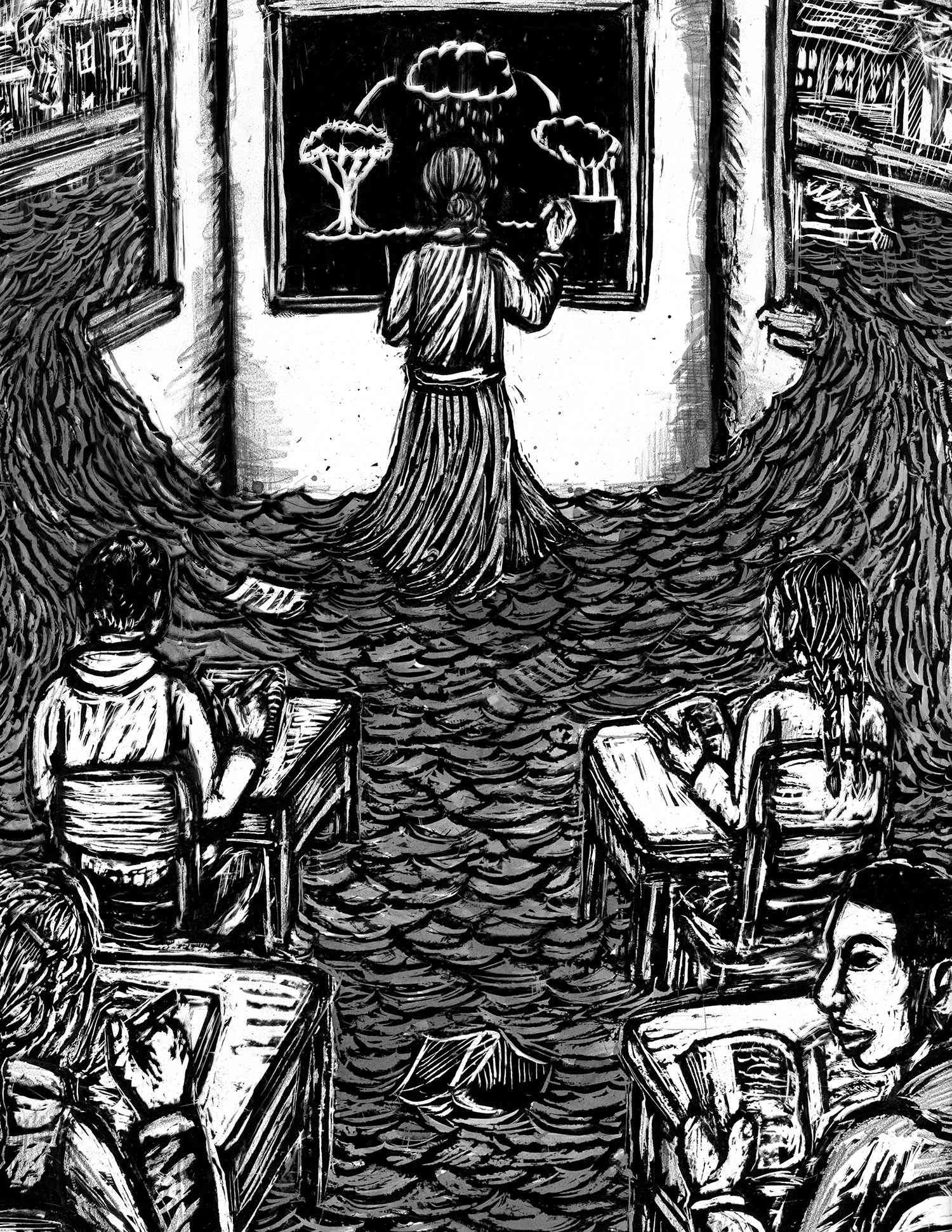Fighting to Teach Climate Justice
Illustrator: Erik Ruin

There remains a huge gulf between the human and ecological consequences of the climate crisis and the puny attention given to the crisis in the school curriculum. The few paragraphs that textbooks devote to climate change don’t help students grasp the dire consequences already tearing through communities around the world. Not surprisingly, these books also fail to explore the causes of this crisis or to engage students in thinking about the kind of social movements that will be necessary to reverse climate change—and to deal with its already horrific effects.
The good news is that this is beginning to change—and there are actions we can take to help speed this change.
Last spring the school board in Portland, Oregon, unanimously passed the most comprehensive climate justice resolution in the country. The resolution requires the school district to “abandon the use of any adopted text material that is found to express doubt about the severity of the climate crisis or its root in human activities.” The resolution also calls for a robust curricular response: “It is essential that in their classes and other school activities students probe the causes and consequences of the climate crisis—as well as possible solutions—in developmentally appropriate ways and, from pre-K through 12th grade, become ‘climate literate.'”
Significantly, the measure approved by the school board does not require the school district to buy newer textbooks, but instead to launch professional development using the expertise of teachers and community members. The resolution calls for the school district to draw “on local resources to build climate justice curriculum—especially inviting the participation of people from ‘frontline’ communities, which have been the first and hardest hit by climate change.”
Underlying the resolution is a vision of students as activists who “develop confidence and passion when it comes to making a positive difference in society, and come to see themselves as activists and leaders for social and environmental justice—especially through seeing the diversity of people around the world who are fighting the root causes of climate change.”
At its 2016 convention, the National Education Association (NEA), the country’s largest teacher union, affirmed that the Portland resolution should be a model for school districts throughout the country; its representative assembly passed a measure committing the NEA to conduct a campaign “to encourage local affiliates, educators, parents, and students to replicate the climate literacy resolution adopted by the Portland, Oregon, school board.”
The Portland resolution grew out of a workshop sponsored by the local affiliate of 350.org, 350PDX, on Rethinking Schools’ A People’s Curriculum for the Earth: Teaching Climate Change and the Environmental Crisis, and led by co-editors Bill Bigelow and Tim Swinehart. This workshop launched a series of meetings of teachers, parents, students, and community activists to discuss how to challenge inaccurate materials used in Portland schools and to introduce more climate justice teaching. These meetings culminated in a draft resolution. Ultimately the school district created its own resolution, which was passed at a meeting attended by almost 100 people, including members of the Sierra Club, 350PDX, the Portland Association of Teachers, Oregon Physicians for Social Responsibility, the Climate Action Coalition, and the Raging Grannies.
Right-wing media immediately understood the national import of Portland’s climate justice resolution. Numerous segments on Fox News, along with articles in the Washington Times, U.S. News & World Report, National Review, Glenn Beck’s The Blaze website, and countless right-wing blogs, denounced the resolution. The director of communications at the climate-denial Heartland Institute wrote that the “logical next step” would be for the resolution’s proponents to “host a book-burning ceremony at the football stadium.”
But support for Portland’s resolution also poured in from around the country. One of the most heartening was a MoveOn.org petition initiated by the national Climate Parents organization, thanking the Portland school board for passing its resolution. Climate Parents delivered more than 1,000 signatures to the school board members, with comments like this one from Christopher Lowe, parent of a Portland high school student: “The board has taken absolutely the right action in standing up for the truth and for teaching the truth. You have my backing and gratitude for acting as you have. . . . You have set a powerful example to Portland Public Schools students and Portlanders at large of how to do good public service.”
A few years back, a group of students from Swarthmore College traveled to Kayford Mountain in West Virginia to spend time with Larry Gibson. An inspiring activist, Gibson refused to bow to the coal companies that wanted to obliterate the mountain where he lived in order to strip the coal seams below. Gibson told his story to the students, but he also warned them that if they didn’t do anything when they returned to Swarthmore, they had wasted his time. These students launched Swarthmore Mountain Justice, which led the first campaign demanding that a college divest from fossil fuels. Their effort launched a global campaign and opened an important front in the battle for climate justice. Rethinking Schools believes that the struggle to bring climate justice curriculum into schools is every bit as significant as the divestment movement. Future activists are in school today. But there are few policies in place that require schools to address students’ need to understand our climate emergency’s causes, consequences, and possible solutions.
There are materials at our website for educators, parents, school board members, students, and community activists who want schools to live up to the imperative of dealing with one of the most challenging issues of our time. Help us build this national effort.

